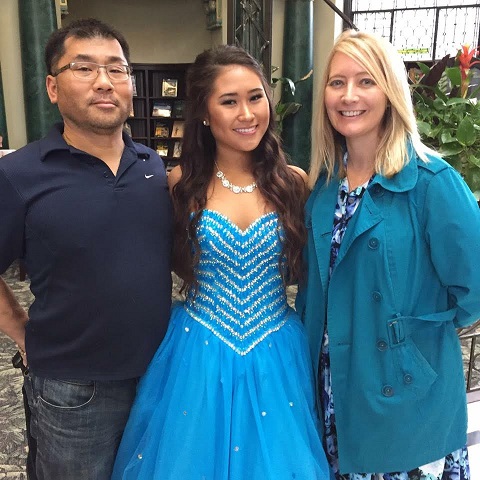My unique perspective on Japanese culture is based on personal relationships. You see, the photo in my post is my sister, niece, and Japanese brother-in-law. My perspective on Japanese culture was shaped based on my sister’s account of living in Tokyo for her first 10 years post graduation teaching English to Japanese college students. Her seemingly rock star status among her Japanese students couldn’t have been more welcoming or appreciated by her. She was treated to concerts and other outings that acclimated her to her new home for the next 10 years. The acquring of educational credentials are a high priority to the Japanese, and their desire to know this foreigner/ teacher with whom they were interacting was very important to her students. As stated in the text, there is a formal politeness among them (Moran, et al, 2011).
My sister moved back to the US with her new husband and daughter after 10 years living in Tokyo. As you can imagine, the transition for my brother-in-law was difficult. Japanese culture is familial and it was difficult to leave his family. His parents, sister and her family, and my brother-in-law shared a home.Though he had learned some English he wasn’t fluent and found it difficult to communicate. He found himself in a new country he had never previously visited and a family to support. Though language was somewhat of a barrier, he found employment quickly and soon became the best worker at his company. His work performance was typical of Japanese workers being respectful of seniority, willing to learn all the jobs at their skill level, and the desire for security and belonging (Moran, et al, 2011). Also, in his generation Japanese workers were employed by the same company for the duration of their career (Moran, et al, 2011). He has worked at the same company since his arrival 20 years ago. The value of striking a work/ life balance, which the younger Japanese are beginning to understand the value of, is something my brother-in-law appreciates about living in the US (Moran, et al, 2011).
I am thankful for the opportunity to have learned about a different culture I otherwise don’t think I would have. The Japanese prefer a “congenial, well-known surroundings, and seek an atmosphere of well focused energy and disciplined good cheer.” (Moran et al, 2011). I am sure my relationship with him has influenced me in a positive way.
Reference:
Abramson, N. R., Moran, R. T., & Moran, S. V. (2014). Managing Cultural Differences. London: Routledge.


Allison, I enjoyed reading this post simply to be able to read your personal perspective on this type of situation. I think coming to the United States as opposed to Japan (like your sister did) is a completely different experience that most (in America) are unaware of. While there are many things to appreciate when living in the United States, there must be a lot of changes to be made. You mentioned certain topics with regards to the differences in cultures and I would be curious to see how someone else, either from an Asian country or simply anywhere else in the world would compare with your brother-in-law. Would they have a lot of similarities with their first difficulties or would there be more differences? I wonder if certain cultures can adapt to living in the United States better than others. While the Japanese are extremely innovative when it comes to technology and business, I feel as though it may be tough, at least in the beginning, to figure out how everything works. With that said, it sounds like your brother-in-law did just fine so there obviously are similarities and even synergy within the cultures.
I think it’s really cool that you are able to bring such first-hand experience to us through your blog, Allison. Thank you for sharing such a personal account. Your sister and her family sounds lovely and it is great to hear that your brother in law has found his way around adjusting to the much, much different conditions that exist in the US compared to his native land.
You made several comments about things that I truly appreciate about the Japanese culture, what little I know of it. My daughter had a little boy in her class, I’ll call him K, that was from Japan. His father was working here for 3-year contract. K was the sweetest thing ever, he learned English remarkably well over the 3 year course and came to spend a ton of time at my house. He loved it and call me Mom and my husband Dad – not because he didn’t have someone to call that, but because that’s what my daughter calls us and I believe that he views that as a sign of respect. Each time he came over K’s mom would arrive with a giant bag filled with goodies for the kids and something special for our family from Japan.
From getting to know that family, they clearly place great importance on education and being polite. I would also say that they are very proud to be Japanese – I loved learning about Tokyo from them, and our daughter begs us to take her for a visit! In reading the section in our text book on Values and Standards I found myself frequently remembering small instances and gestures from that family that did make an impact on our family. They had a fun loving outlook on life, and we are thrilled to still be in touch with them!